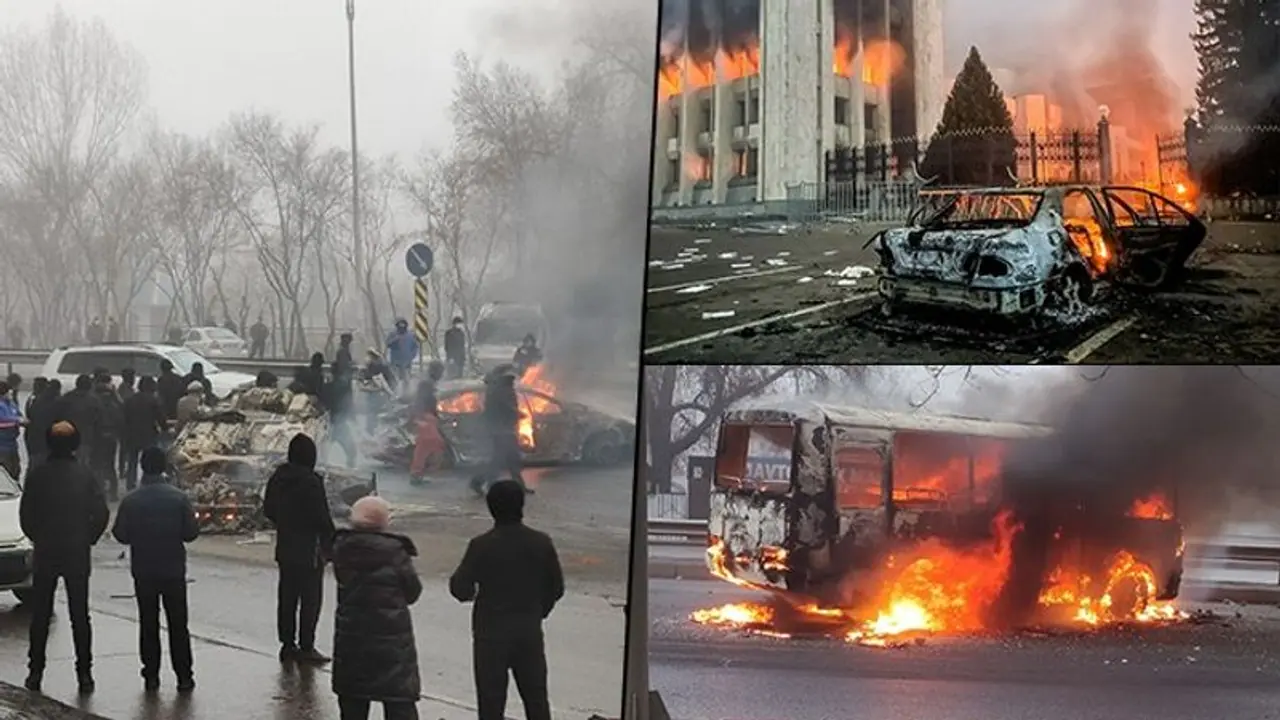At least 164 people have reportedly been killed in several days of unrest in Kazakhstan, and almost 8,000 people have been arrested after riots broke out in Central Asia's largest country.
At least 164 people have reportedly lost their lives in several days of unrest in Kazakhstan, and almost 8,000 people have been arrested after riots broke out in Central Asia's largest country. Known for its rich energy reserves, Kazakhstan has witnessed a week of turmoil, with several foreigners facing the brunt of the unrest.

Internet services, too, has returned to Kazakhstan's largest city following a five-day blackout. Almaty, the country's former capital, has been offline since January 5 amid a wave of fierce commotion.
Let's look at why there are riots in Kazakhstan and why are Russian troops there?

Kazakhstan is a vast nation situated in Central Asia and borders China and Russia. Made of mountains and arid steppe land, it has only 19 million people. The country gained independence in 1991 post the collapse of the Soviet Union.
Kazakhstan has some of the most extensive oil resources in the world and reportedly produces about 1.6 million barrels of oil on a daily basis, adding to the foreign investment reserves of the nation. However, the people of the country have not seen any improvement in their average income despite its energy-resources drawing billions of dollars.
For close to three decades, President Nursultan Nazarbayev, who is known to have close ties with Russian President Vladimir Putin, ruled Kazakhstan. Under his rule, a new capital, Astana, was built that was later renamed Nur-Sultan. However, in 2019, Nazarbayev stepped down, making way for current President Kassym-Jomart Tokayev.
What has happened in Kazakhstan?
On January 2, 2022, protests erupted in Kazakhastan's oil epicentre, Zhanaozen. In quick succession, demonstrations spread to other parts of the country, including Almaty, where security forces took action against rioters for taking control of police stations in the city.
President Kassym-Jomart Tokayev on Friday had said that 20,000 bandits had attacked Almaty and that he ordered security forces to fire without warning. Thousands have reportedly been injured nationwide, and more than 8,000 people have been arrested. Curfews have been announced, and mass assemblages have been banned.
Why did the riots start?
The demonstrations started when the government lifted its price cap on liquefied petroleum gas (LPG). Many Kazakhs converted their vehicles to use LPG because it was cheaper than other available fuels. However, the government said the price cap led to a shortage in LPG and could no longer afford to expand supplies. The government's move to remove the cap practically doubled the price.
The rioters were also unhappy with former President Nazarbayev holding a key position in the government as head of Kazakhstan's Security Council. According to observers, Nazarbayev also seemed to be readying his daughter Dariga as a future leader. To appease the protesters, he has been removed from his post.
How is Russia getting involved?
At the request of the Kazakh president, Russia has sent its paratroopers to aid "stabilise" the country. They have been sent under the Collective Security Treaty Organization (CSTO), which was set up in 1991 following the collapse of the Soviet Union comprising of Russia, Kazakhstan, Belarus, Tajikistan, Kyrgyzstan and Armenia.
The CSTO, chaired by Armenia, has blamed the trouble in Almaty on an invasion of bandit formations trained from abroad. Reports suggest 2,500 troops have been sent from CSTO states to Kazakhstan, of which most of them are Russians.
The CSTO says the troops are a peacekeeping force that will shield state and military facilities such as gas pipelines, Russian military bases and the Russian space station at Baikonur.
What happens next?
Apart from putting off the removal of its price cap on LPG and ordering vehicle fuel prices to be regulated for six months, the Kazakhstan government has also sacked several ministers.
Meanwhile, President Kassym-Jomart Tokayev admitted that his government had failed to keep inflation in check, which eventually led to the ongoing crisis.
Protests may continue in Zhanaozen, even if security forces put protests in Almaty to an end, as the former has a history of anti-government demonstrations.
Meanwhile, the United States has questioned whether CSTO troops were lawfully invited into the country. The White House has said that it would keep a close watch on human rights violations and any uncalled-for actions that could lead to "the seizure of Kazakh institutions."
Also watch: Choosing pets over kids is 'selfish and diminishes us', says Pope Francis
